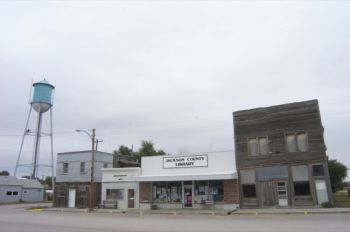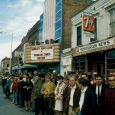The Gift of South Dakota
Subscriptions to South Dakota Magazine make great gifts!
Subscribe today — 1 year (6 issues) is just $29!
Free Market Vs. Small Towns
Apr 3, 2013
I want to believe in small towns. The free market does not.
Right after blogging about how our state economic development efforts may be accelerating our rural population drain by promoting jobs in "urban" counties that are already growing, I read the depressing news that after 85 years, Chester Hardware is closing its doors. Owner Denny Benson (grandson of founder Emil Benson) understood all the good his store did for his small town. But he had to give in to economics:
"...operating a hardware store in a small town just isn't feasible anymore. My accountant has been urging me to get out of the business for six years or more. I would have liked to continue the hardware store, but the overhead in operating such a business just doesn't make sense in these times [Denny Benson, quoted by Gale Pifer, "Chester Hardware Closes Its Doors," Madison Daily Leader, 2013.04.01].
A friend tells me Hogen's Hardware in Kadoka is for sale and may close. Another connects the draining of rural population with the shift to Monsanto-based industrial agriculture—more chemicals, bigger machines, and giant farms mean too few people to sustain a vibrant local economy. A third says the decline of our small towns may be the market's correction of "rural sprawl."
South Dakota's small towns grew around small farms. The market has almost eliminated small farms. If there is no longer an extensive local agrarian base to whom small towns supply hardware, groceries, entertainment, and public services, then on what new basis can formerly agrarian small towns survive and thrive?
I want to believe we can telecommute and microenterprise our way to small-town revival, with help from the occasional big beef jerky factory. But telecommuters don't spend their whole lives online. Small business owners want to take their kids to dance classes and museums less than 50 miles away. And healthy communities need wealth and power distributed among numerous property holders (ah, Jeffersonian agrarian democracy!) rather than concentrated in the pockets of one big employer on whom the vitality of the local economy critically depends.
Until and unless a revolution achieves Wendell Berry's dream of resettling America with small independent farms selling their goods to local eaters, many South Dakota small towns will look like grim re-enactments of Children of Men. Most of the kids will leave to increase their economic opportunities; most of the residents who stay will hang on to houses that won't sell.
38 of South Dakota's 66 counties have lost population since 1980. I'm still struggling to figure out the minimum threshold of population and proximity necessary for a sustainable community. But if the free market judges small towns unsustainable, how should we fight that harsh judgment? And should we fight it?
Editor's Note: Cory Heidelberger is our political columnist from the left. For a right-wing perspective on politics, please look for columns by Dr. Ken Blanchard every other Monday on this site.
Cory Allen Heidelberger writes the Madville Times political blog. He grew up on the shores of Lake Herman. He studied math and history at SDSU and information systems at DSU, and is currently teaching French at Spearfish High School. A longtime country dweller, Cory is enjoying "urban" living with his family in Spearfish.










